Correspondence between Field Marshal Lord William Birdwood and Lady Janetta Birdwood, 1916 and 1918 - Part 3
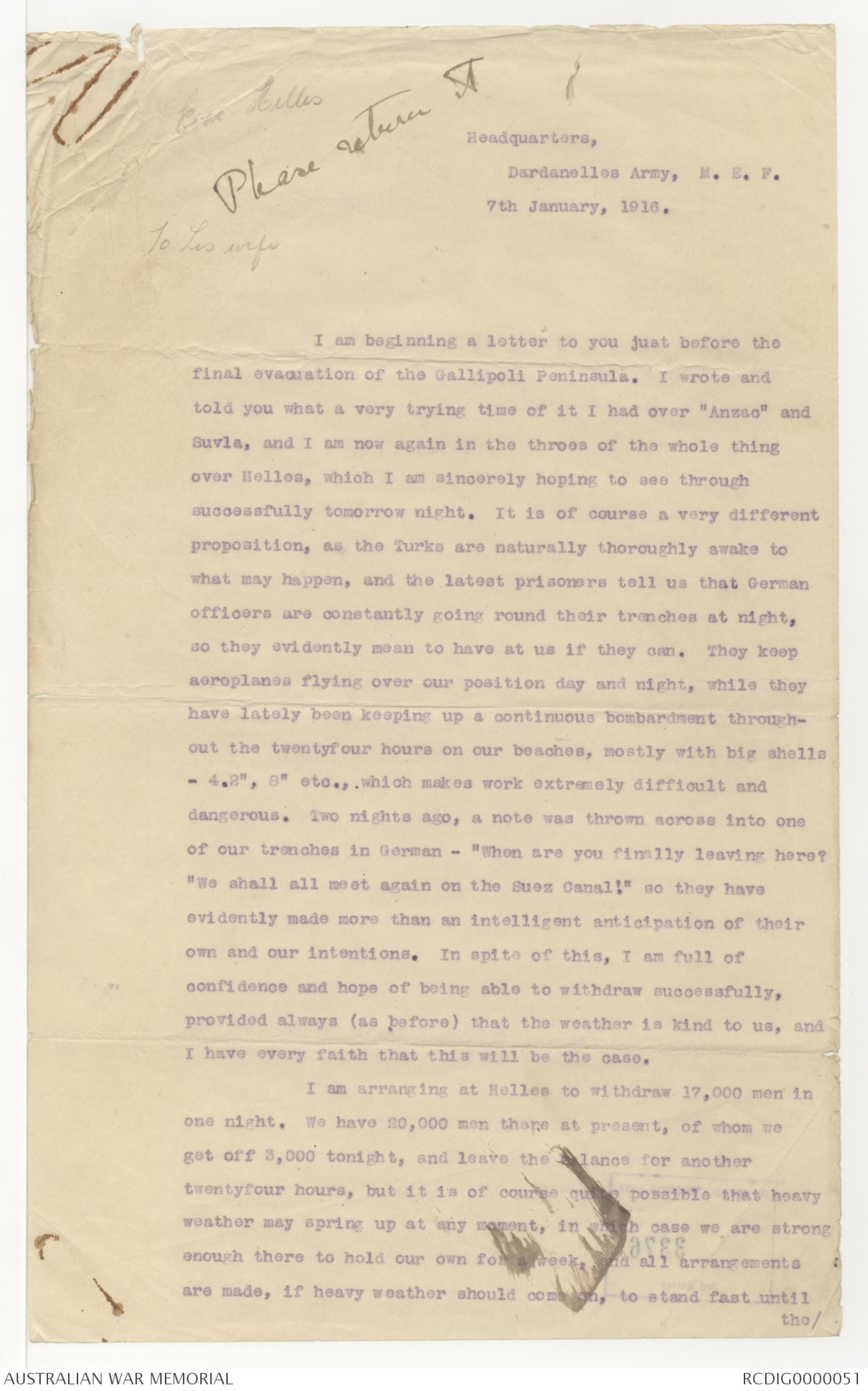
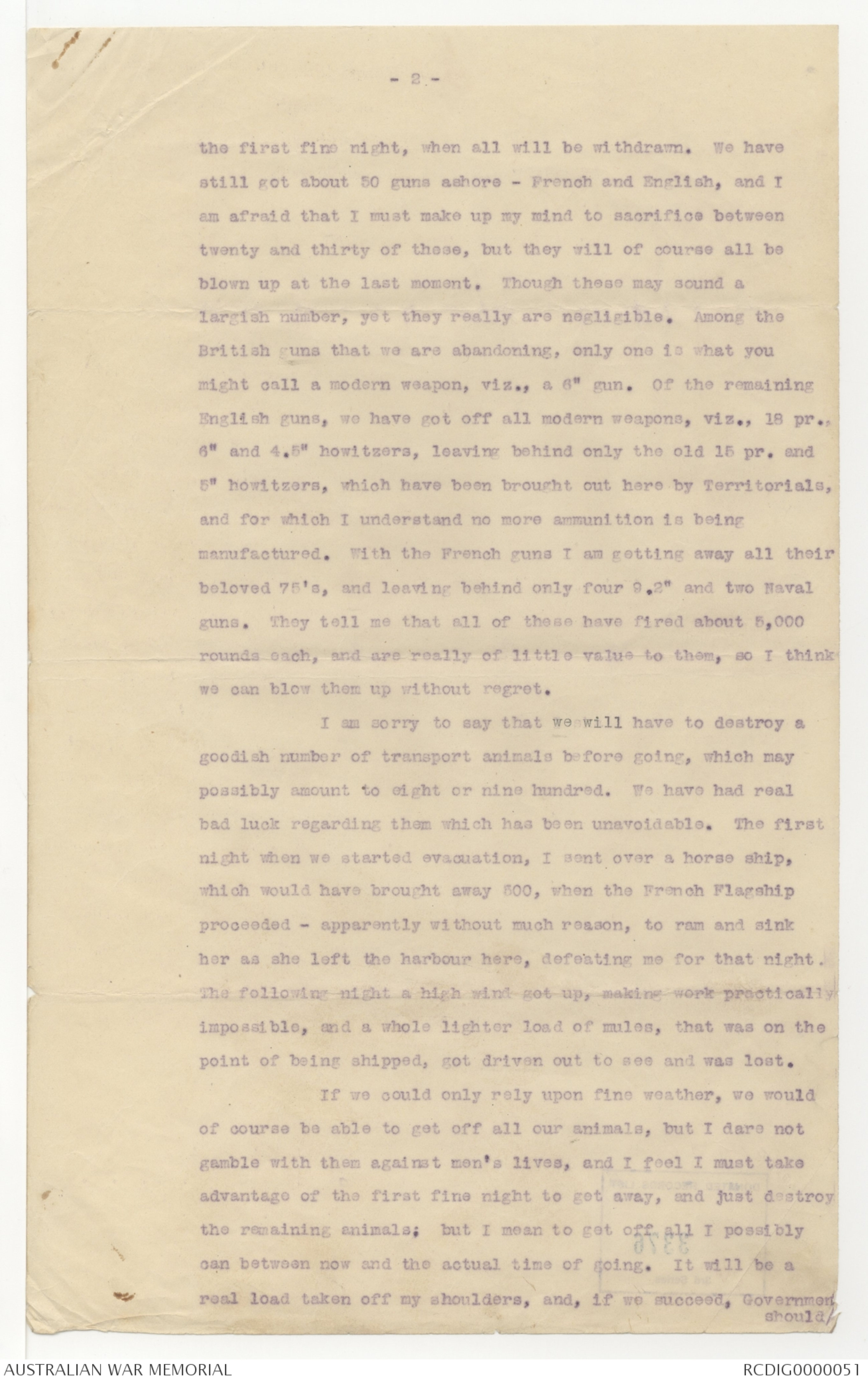
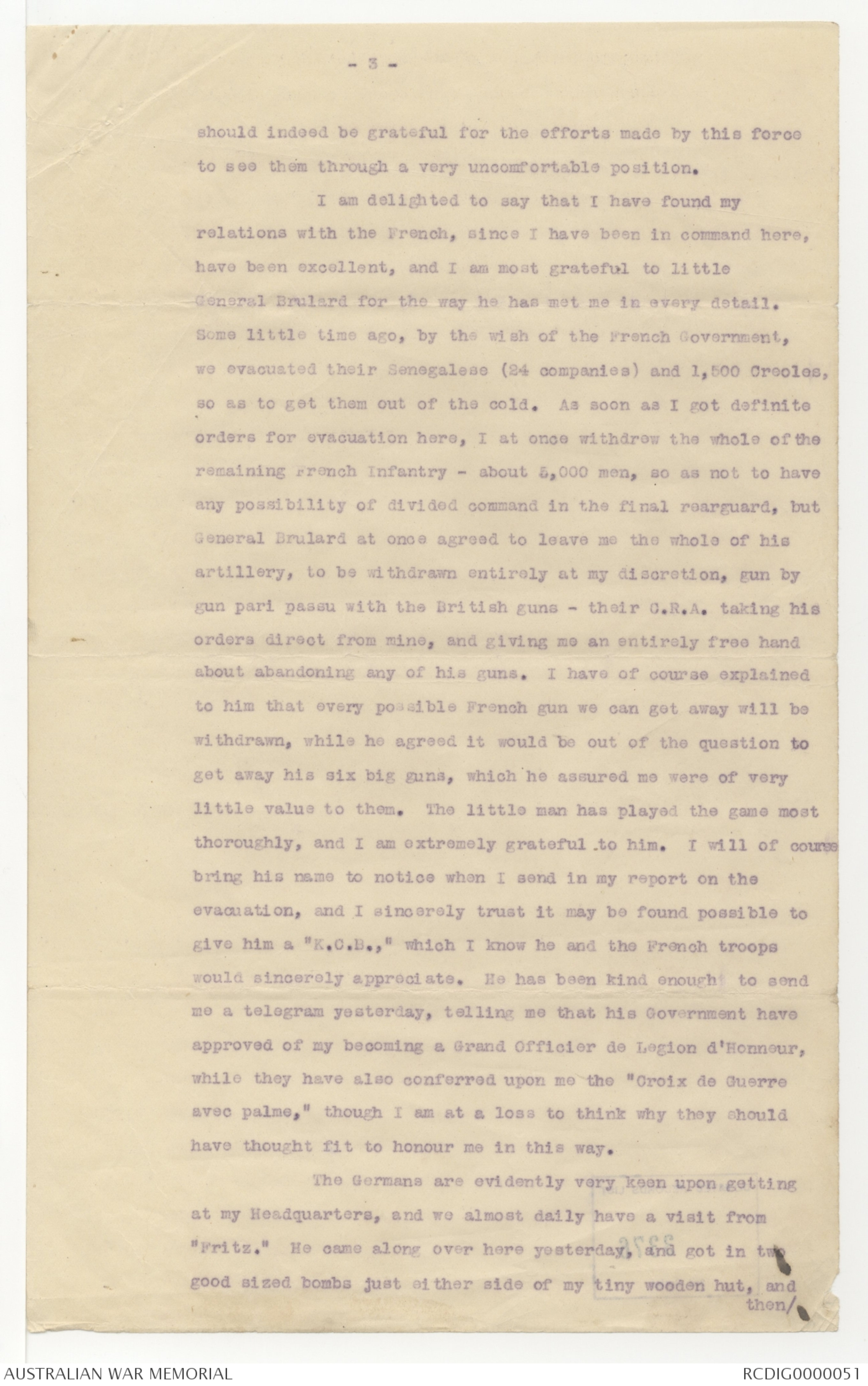
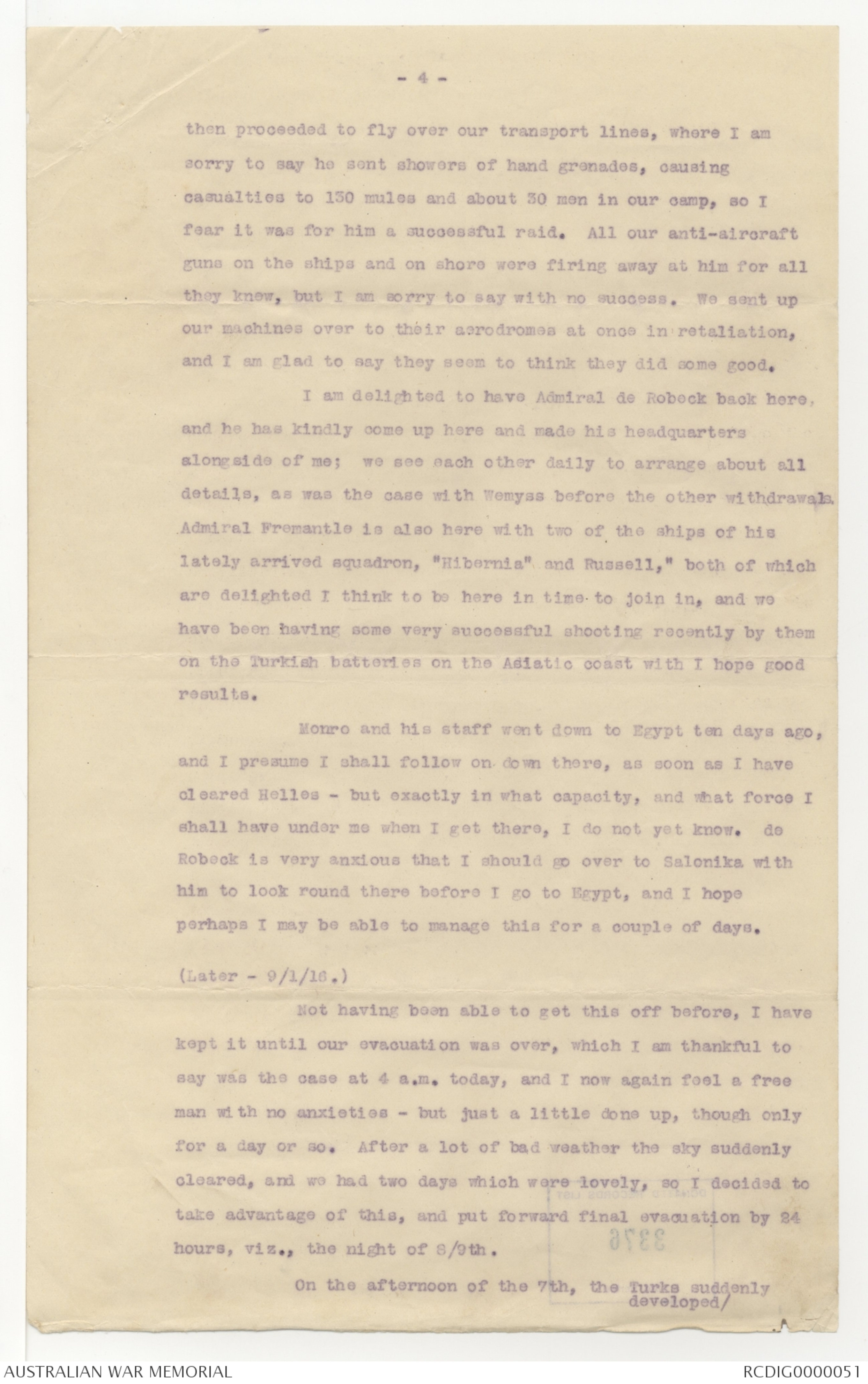
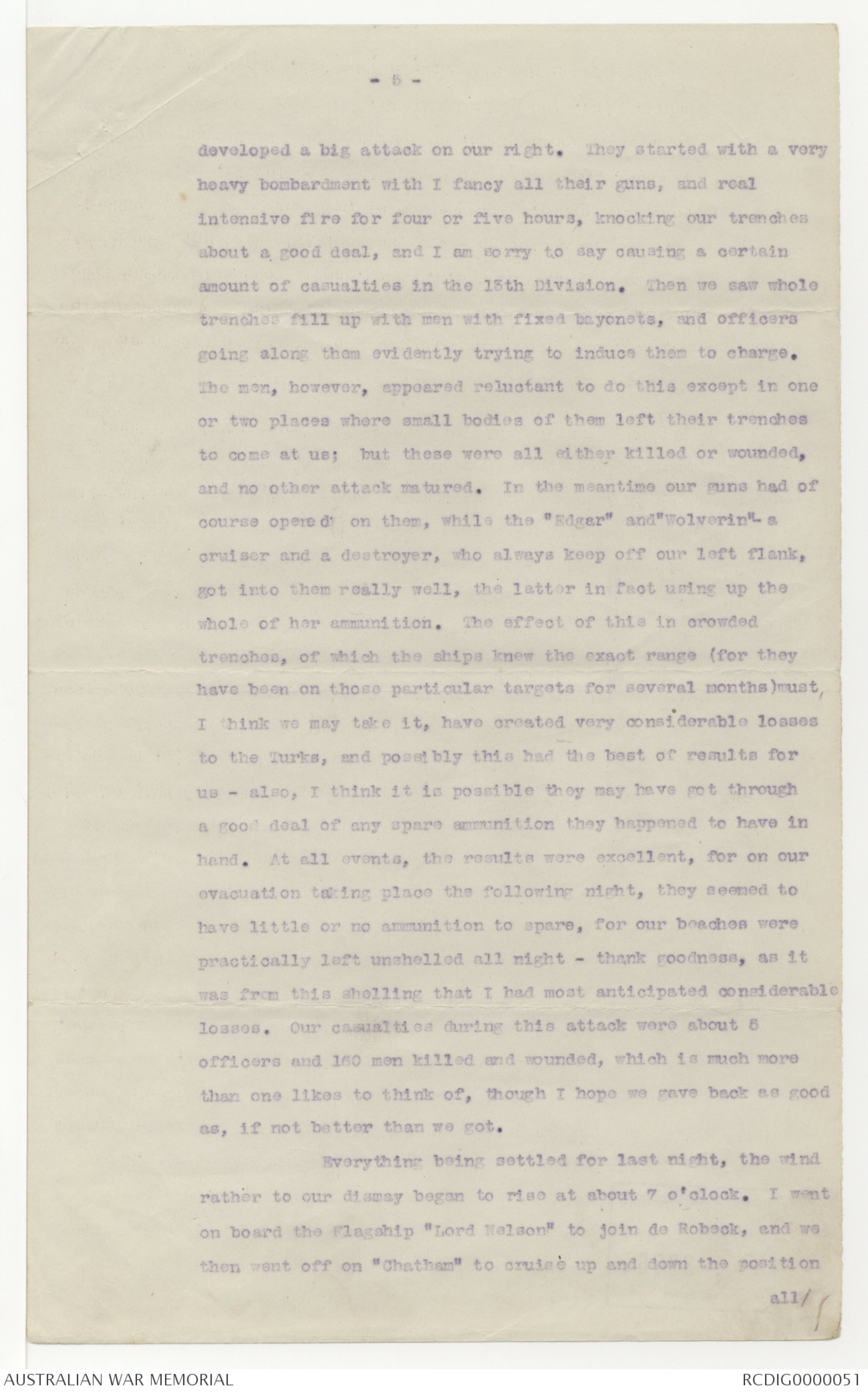
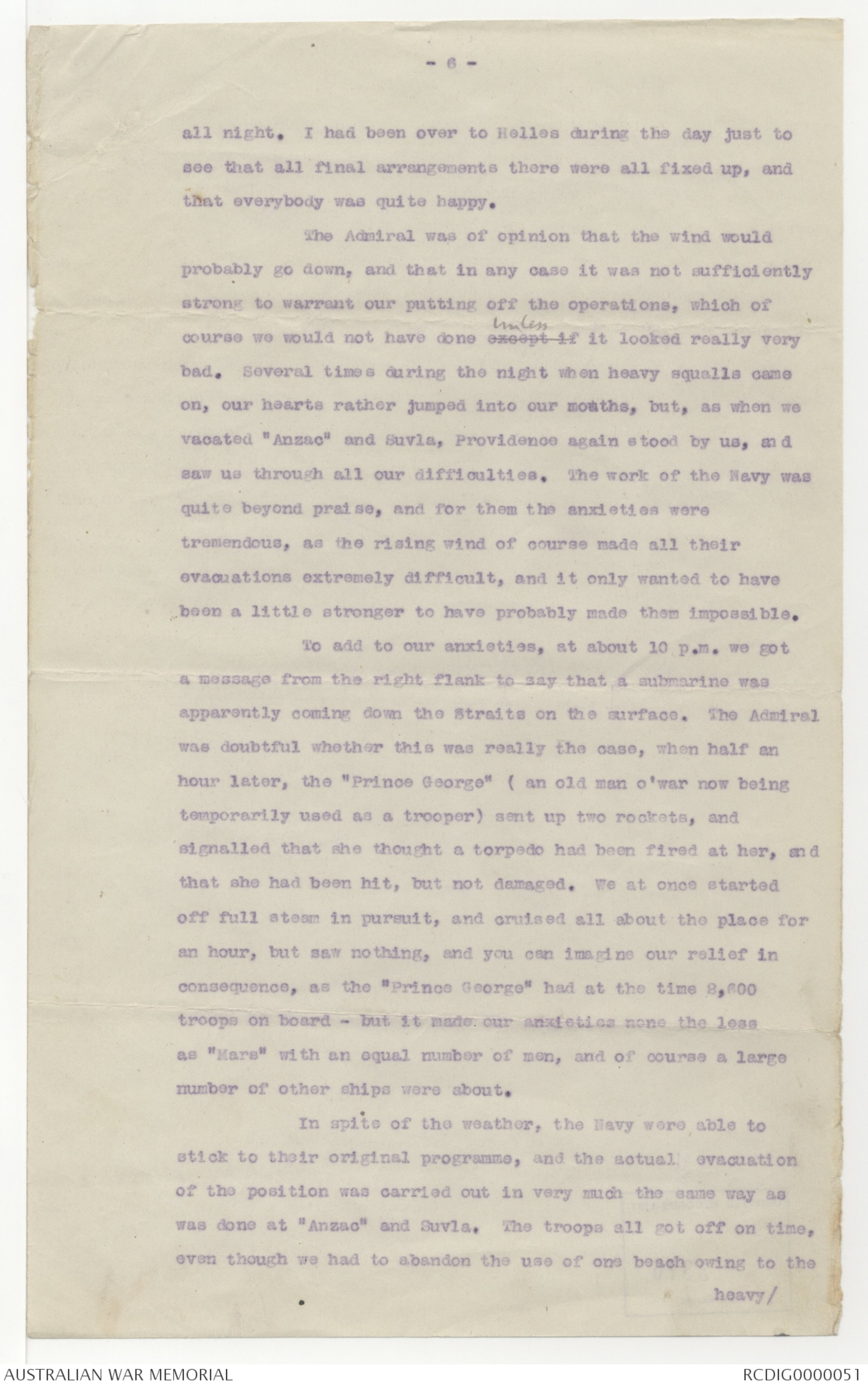
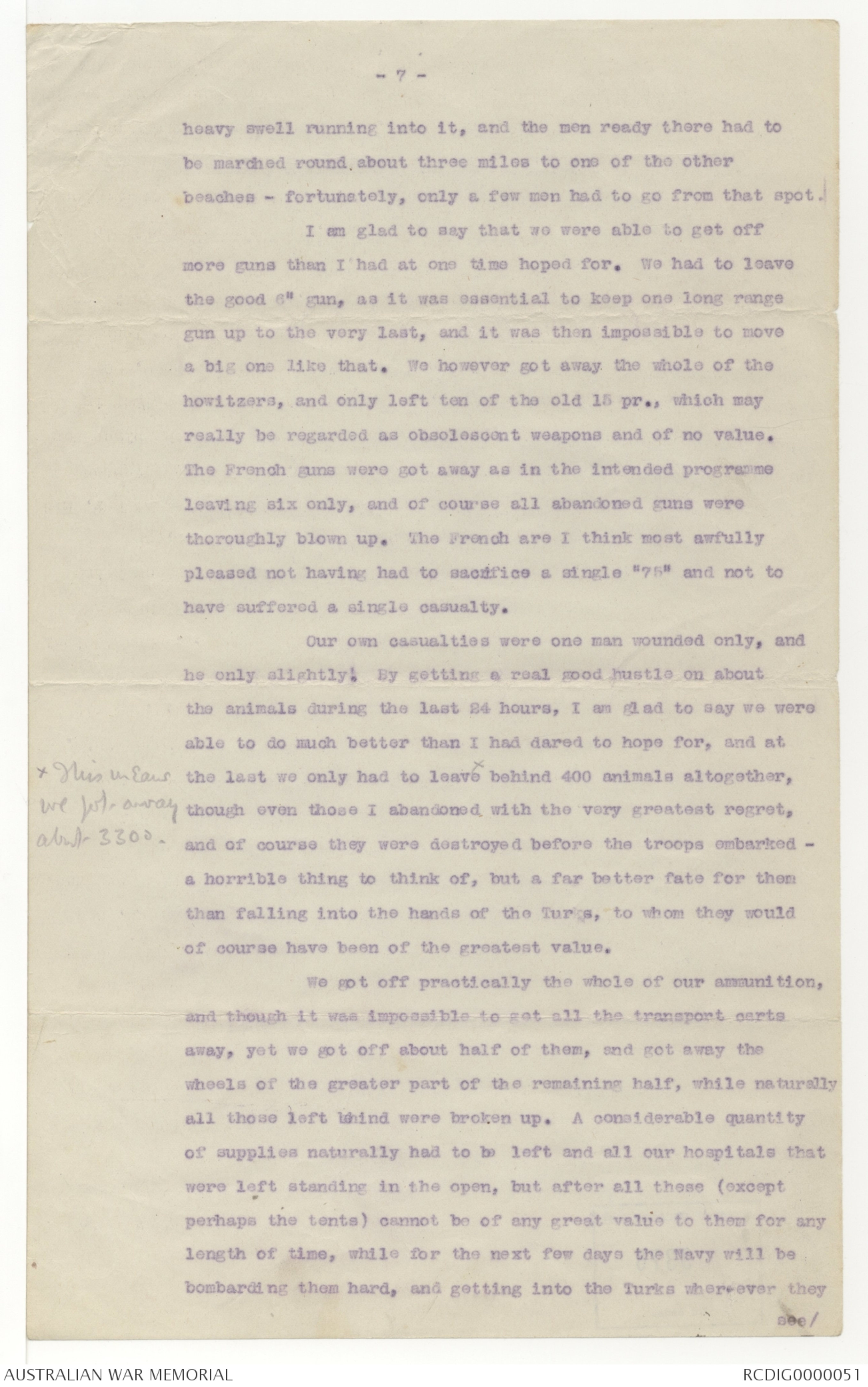
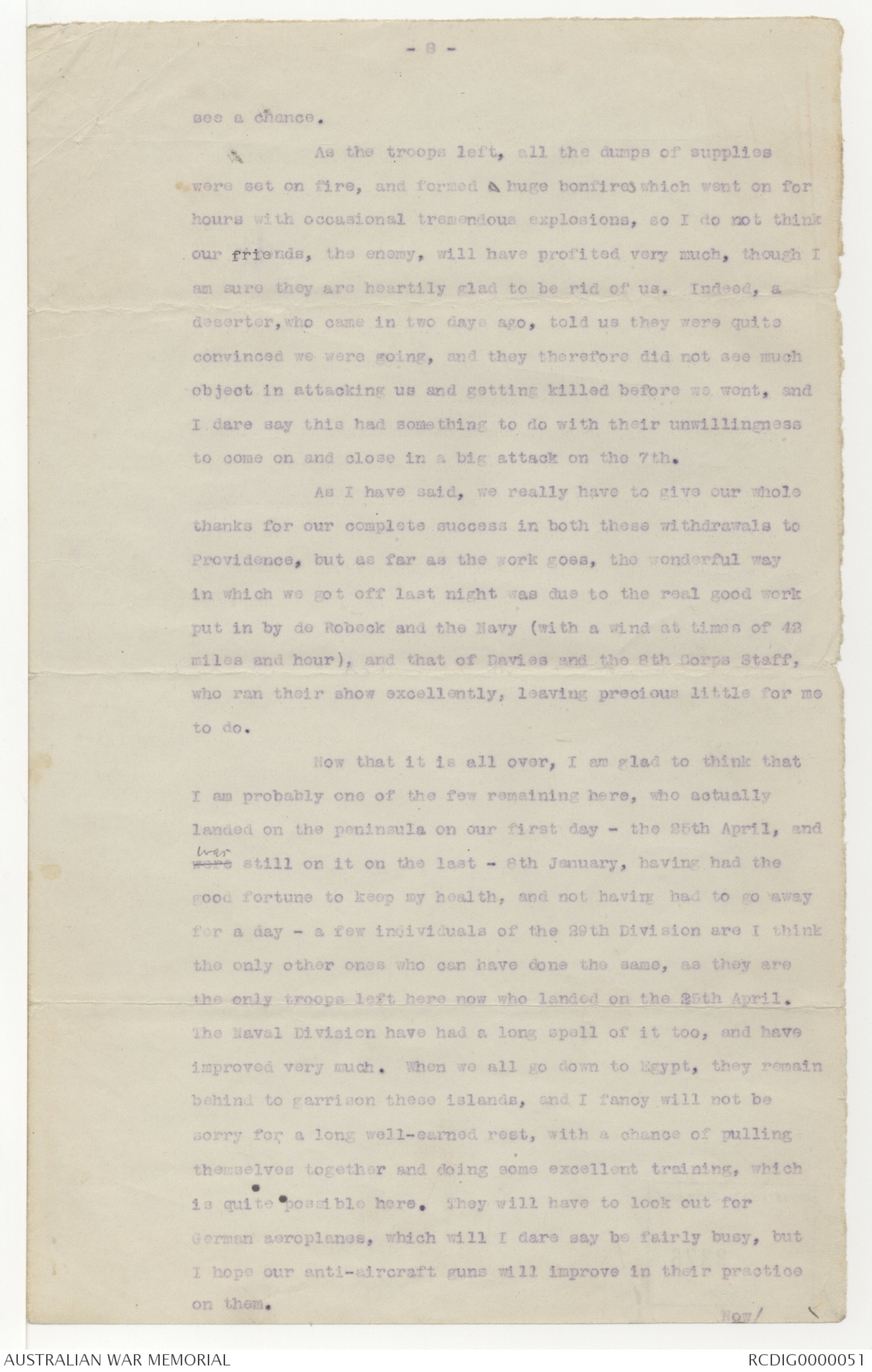
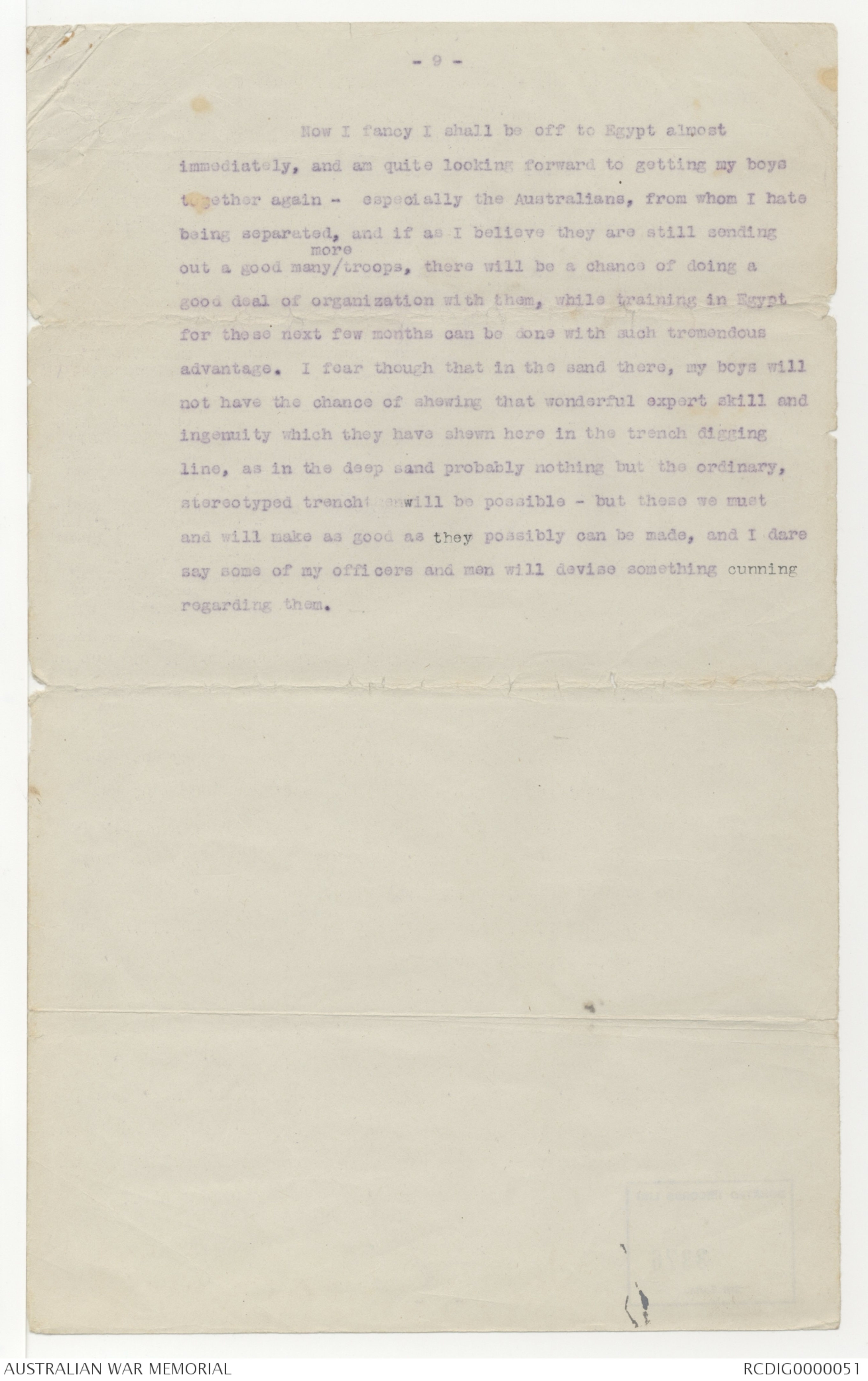
[*Cape Helles*]
[*Please return it*]
Headquarters,
Dardanelles Army, M E. F.
7th January, 1916.
[*To his wife*]
I am beginning a letter to you just before the
final evacuation of the Gallipoli Peninsula. I wrote and
told you what a very trying time of it I had over "Anzac" and
Suvla, and I am now again in the throes of the whole thing
over Helles, which I am sincerely hoping to see through
successfully tomorrow night. It is of course a very different
proposition, as the Turks are naturally thoroughly awake to
what may happen, and the latest prisoners tell us that German
officers are constantly going round their trenches at night,
so they evidently mean to have at us if they can. They keep
aeroplanes flying over our position day and night, while they
have lately been keeping up a continuous bombardment through-
out the twentyfour hours on our beaches, mostly with big shells
- 4.2", 8" etc., which makes work extremely difficult and
dangerous. Two nights ago, a note was thrown across into one
of our trenches in German - "When are you finally leaving here?
"We shall all meet again on the Suez Canal!" so they have
evidently made more than an intelligent anticipation of their
own and our intentions. In spite of this, I am full of
confidence and hope of being able to withdraw successfully,
provided always (as before) that the weather is kind to us, and
I have every faith that this will be the case.
I am arranging at Helles to withdraw 17,000 men in
one night. We have 20,000 men there at present, of whom we
get off 3,000 tonight, and leave the balance for another
twentyfour hours, but it is of course quite possible that heavy
weather may spring up at any moment, in which case we are strong
enough there to hold our own for a week, and all arrangements
are made, if heavy weather should come on, to stand fast until
the/
-2-
the first fine night, when all will be withdrawn. We have
still got about 50 guns ashore - French and English, and I
am afraid that I must make up my mind to sacrifice between
twenty and thirty of these, but they will of course all be
blown up at the last moment. Though these may sound a
largish number, yet they really are negligible. Among the
British guns that we are abandoning, only one is what you
might call a modern weapon, viz., a 6" gun. Of the remaining
English guns, we have got off all modern weapons, viz., 18 pr.,
6" and 4.5" howitzers, leaving behind only the old 15 pr. and
5" howitzers, which have been brought out here by Territorials,
and for which I understand no more ammunition is being
manufactured. With the French guns I am getting away all their
beloved 75's, and leaving behind only four 9.2" and two Naval
guns. They tell me that all of these have fired about 5,000
rounds each, and are really of little value to them, so I think
we can blow them up without regret.
I am sorry to say that we will have to destroy a
goodish number of transport animals before going, which may
possibly amount to eight or nine hundred. We have had real
bad luck regarding them which has been unavoidable. The first
night when we started evacuation, I sent over a horse ship,
which would have brought away 500, when the French Flagship
proceeded - apparently without much reason, to ram and sink
her as she left the harbour here, defeating me for that night.
The following night a high wind got up, making work practically
impossible, and a whole lighter load of mules, that was on the
point of being shipped, got driven out to see and was lost.
If we could only rely upon fine weather, we would
of course be able to get off all our animals, but I dare not
gamble with them against men's lives, and I feel I must take
advantage of the first fine night to get away, and just destroy
the remaining animals; but I mean to get off all I possibly
can between now and the actual time of going. It will be a
real load taken off my shoulders, and, if we succeed, Government
should
-3-
should indeed be grateful for the efforts made by this force
to see them through a very uncomfortable position.
I am delighted to say that I have found my
relations with the French, since I have been in command here,
have been excellent, and I am most grateful to little
General Brulard for the way he has met me in every detail.
Some little time ago, by the wish of the French Government,
we evacuated their Senegalese (24 companies) and 1,500 Creoles,
so as to get them out of the cold. As soon as I get definite
orders for evacuation here, I at once withdrew the whole of the
remaining French Infantry - about 5,000 men, so as not to have
any possibility of divided command in the final rearguard, but
General Brulard at once agreed to leave me the whole of his
artillery, to be withdrawn entirely at my discretion, gun by
gun pari passu with the British guns - their C.R.A. taking his
orders direct from mine, and giving me an entirely free hand
about abandoning any of his guns. I have or course explained
to him that every possible French gun we can get away will be
withdrawn, while he agreed it would be out of the question to
get away his six big guns, which he assured me were of very
little value to them. The little man has played the game most
thoroughly, and I am extremely grateful to him. I will of course
bring his name to notice when I send in my report on the
evacuation, and I sincerely trust it may be found possible to
give him a "K.C.B.," which I know he and the French troops
would sincerely appreciate. He has been kind enough to send
me a telegram yesterday, telling me that his Government have
approved of my becoming a Grand Officier de Legion d'Honneur,
while they have also conferred upon me the "Croix de Guerre
avec palme," though I am at a loss to think why they should
have thought fit to honour me in this way.
The Germans are evidently very keen upon getting
at my Headquarters, and we almost daily have a visit from
"Fritz." He came along over here yesterday, and got in two
good sized bombs just either side of my tiny wooden hut, and
then/
-4-
then proceeded to fly over our transport lines, where I am
sorry to say he sent showers of hand grenades, causing
casualties to 130 mules and about 30 men in our camp, so I
fear it was for him a successful raid. All our anti-aircraft
guns on the ships and on shore were firing away at him for all
they knew, but I am sorry to say with no success. We sent up
our machines over to their aerodromes at once in retaliation,
and I am glad to say they seem to think they did some good.
I am delighted to have Admiral de Robeck back here,
and he has kindly come up here and made his headquarters
alongside of me; we see each other daily to arrange about all
details, as was the case with Wemyas before the other withdrawals.
Admiral Fremantle is also here with tow of the ships of his
lately arrived squadron, "Hibernia" and Russell," both of which
are delighted I think to be here in time to join in, and we
have been having some very successful shooting recently by them
on the Turkish batteries on the Asiatic coast with I hope good
results.
Monro and his staff went down to Egypt ten days ago,
and I presume I shall follow on down there, as soon as I have
cleared Helles - but exactly in what capacity, and what force I
shall have under me when I get there, I do not yet know. de
Robeck is very anxious that I should go over to Salonika with
him to look round there before I go to Egypt, and I hope
perhaps I may be able to manage this for a couple of days.
(Later - 9/1/16.)
Not having been able to get this off before, I have
kept it until our evacuation was over, which I am thankful to
say was the case at 4 a.m. today, and I now again feel a free
man with no anxieties - but just a little done up, though only
for a day or so. After a lot of bad weather the sky suddenly
cleared, and we had two days which were lovely, so I decided to
take advantage of this, and put forward final evacuation by 24
hours, viz., the night of 8/9th.
On the afternoon of the 7th, the Turks suddenly
developed/
- 5 -
developed a big attack on our right. They started with a very
heavy bombardment with I fancy all their guns, and real
intensive fire for four or five hours, knocking our trenches
about a good deal, and I am sorry to say causing a certain
amount of casualties in the 13th Division. Then we saw whole
trenches fill up with men with fixed bayonets, and officers
going along them evidently trying to induce them to charge.
The men, however, appeared reluctant to do this except in one
or two places where small bodies of them left their trenches
to come at us; but these were all either killed or wounded,
and no other attack matured. In the meantime our guns had of
course opened on them, while the "Edgar" and "Wolverin" - a
cruiser and a destroyer, who always keep off our left flank,
got into them really well, the latter in fact using up the
whole of her ammunition. The effect of this in crowded
trenches, of which the ships knew the exact range (for they
have been on those particular targets for several months) must,
I think we may take it, have created very considerable losses
to the Turks, and possibly this had the best of results for
us - also, I think it is possible they may have got through
a good deal of any spare ammunition they happened to have in
hand. At all events, the results were excellent, for on our
evacuation taking place the following night, they seemed to
have little or no ammunition to spare, for our beaches were
practically left unshelled all night - thank goodness, as it
was from this shelling that I had most anticipated considerable
losses. Our causalities during this attack were about 5
officers and 160 men killed and wounded, which is much more
than one likes to think of, though I hope we gave back as good
as, if not better than we got.
Everything being settled for last night, the wind
rather to our dismay began to rise at about 7 o'clock. I went
on board the flagship "Lord Nelson" to join de Robeck, and we
then went off on "Chatham" to cruise up and down the position
all/
-6-
all night. I had been over to Helles during the day just to
see that all final arrangements there were all fixed up, and
that everybody was quite happy.
The Admiral was the opinion that the wind would
probably go down, and that in any case it was not sufficiently
strong to warrant our putting off operations, which of
course we would not have done except if unless it looked really very
bad. Several times during the night when heavy squalls came
on, our hearts rather jumped into our mouths, but, as when we
vacated "Anzac" and Suvla, Providence again stood by us, an d
saw us thought all our difficulties. The work of the Navy was
quite beyond praise, and for them the anxieties were
tremendous, as the rising wind of course made all their
evacuations extremely difficult, and it only wanted to have
been a little stronger to have probably made them impossible.
To add to our anxieties, at about 10 p.m. we got
a message from the right flank to say that a submarine was
apparently coming down the Straits on the surface. The Admiral
was doubtful whether this was really the case, when half an
hour later, the "Prince George" ( an old man o'war now being
temporarily used as a trooper) sent up two rockets, and
signalled that she thought a torpedo had been fired at her, and
that she had been hit, but not damaged. We at once started
off full steam in pursuit, and cruised all about the place for
an hour, but saw nothing, and you can imagine our relief in
consequence, as the "Prince George" had at the time 8,600
troops on board - but it made our anxieties none the less
as "Mars" with an equal number of men, and of course a large
number of other ships were about.
In spite of the weather, the Navy were able to
stick to their original programme, and the actual evacuation
of the position was carried out in very much the same way as
was done at "Anzac" and Suvla. The troops all got off on time,
even though we had to abandon the use of one beach owing to the
heavy/
-7-
heavy swell running into it, and the men ready there had to
be marched round about three miles to one of the other
beaches - fortunately, only a few men had to go from that spot.
I am glad to say that we were able to get off
more guns than I had at one time hoped for. We had to leave
the good 6" gun, as it was essential to keep one long range
gun up to the very last, and it was then impossible to move
a big one like that. We however got away the whole of the
howitzers, and only left ten of the old 15 pr., which may
really be regarded as obsolescent guns and of no value.
The French guns were got away as in the intended programme
leaving six only, and of course all abandoned guns were
thoroughly blown up. The French are I think most awfully
pleased not having had to sacrifice a single '75" and not to
have suffered a single casualty.
Our own casualties were one man wounded only, and
and he only slightly! By getting a real good hustle on about
the animals during the last 24 hours, I am glad to say we were
able to do much better than I had dared to hope for, and at
the last we only had to leave x behind 400 animals altogether,
[* x This meant we got away about 3300.]
though even those I abandoned with the very greatest regret,
and of course they were destroyed before the troops embarked -
a horrible thing to think of, but a far better fate for them
than falling into the hands of the Turks, to whom they would
of course have been of the greatest value.
We got off practically the whole of our ammunition,
and though it was impossible to get all the transport carts
away, yet we got off about half of them. and got away the
wheels of the greater part of the remaining half, while naturally
all those left behind were broken up. A considerable quantity
of supplies naturally had to be left and all our hospitals that
were left standing in the open, but after all these (except
perhaps the tents) cannot be of any great value to them for any
length of time, while for the next few days the Navy will be
bombarding them hard, and getting into the Turks wherever they
see/
-8-
see a chance.
As the troops left, all the dumps of supplies
were set on fire, and formed a huge bonfires which went on for
hours with occasional tremendous explosions, so I do not think
our friends, the enemy, will have profited very much, though I
am sure they heartily glad to be rid of us. Indeed, a
deserter, who came in two days ago, told us they were quite
convinced we were going, and they therefore did not see much
object in attacking us and getting killed before we went, and
I dare say this had something to do with their unwillingness
to come on and close in a big attack on the 7th.
As I have said, we really have to give our whole
thanks for our complete success in both these withdrawals to
Providence, but as far as the work goes, the wonderful way
in which we got off last night was due to the real good work
put in by de Robeck and the Navy (with a wind at times of 42
miles an hour), and that of Davies and the 8th Corps Staff,
who ran their show excellently, leaving precious little for us to do.
Now that it is all over, I am glad to think that
I am probably one of the few remaining here, who actually
landed on the peninsula on our first day - the 25th April, and were was still on it on the last - 8th January, having had the
good fortune to keep my health, and not having had to go away
for a day - a few individuals of the 29th Division are I think
are the only other ones who can have done the same, as they are
the only troops left here now who landed on the 25th April.
The Naval Division have had a long spell of it too, and have
improved very much. When we all go down to Egypt, they remain
behind to garrison these islands, and I fancy will not be
sorry for a long well-earned rest, with a chance of pulling
themselves together and doing some excellent training, which
is quite possible here. They will have to look out for
German aeroplanes, which will I dare say be fairly busy, but
I hope our anti-aircraft guns will improve in their practice
on them.
Now/
-9-
Now I fancy I shall be off to Egypt almost
immediately, and am quite looking forward to getting my boys
together again - especially the Australians, from whom I hate
being separated, and if as I believe they are still sending
out a good many/more troops, there will be a chance of doing a
good deal of organization with them, while training in Egypt
for these next few months can be done with such tremendous
advantage. I fear though that in the sand there, my boys will
not have the chance of shewing that wonderful expert skill and
ingenuity which they have shewn here in the trench digging
line, as in the deep sand probably nothing but the ordinary,
stereotyped trencht enwill be possible - but these we must
and will make as good as they possibly can be made, and I dare
say some of my officers and men will devise something cunning
regarding them.
 Jacqueline Kennedy
Jacqueline KennedyThis transcription item is now locked to you for editing. To release the lock either Save your changes or Cancel.
This lock will be automatically released after 60 minutes of inactivity.